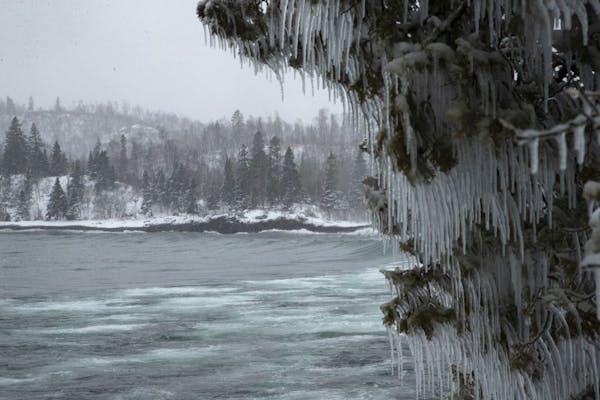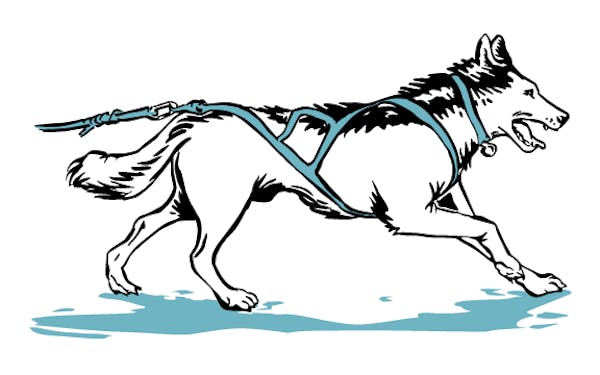DULUTH – Finally, it was almost time to run the 36th John Beargrease Sled Dog Marathon late Sunday morning.
Seal, a tri-colored, two-year-old Alaskan Husky with green booties strapped on her paws, was rarin' to go in her first big race. She tugged forward on her harness. She squealed. She jumped in place. She barked.
As her musher Liza Dietzen predicted, the young hyper canine simply couldn't contain herself as the crowd lining the chute counted down: "Ten … nine … eight …"
Just let us go already! The expression on Seal's furry face was plain for all to see as she kept tugging, her long tongue splayed to the side.
"I don't need to teach them to be sled dogs," Dietzen said ahead of the race. "That is something that is born in them."
"Three … two … one." And they were off, pent-up energy finally unleashed for the 2½-day race.
Team after team followed about every two minutes until early afternoon, with 14 teams running the full marathon of nearly 300 miles; 30 running the mid-distance 120-mile race and 13 running a 40-miler.
Named after John Beargrease, who delivered mail between Two Harbors and Grand Marais by dog sled in the late 1800s, the race is the longest-running and among the longest length sled dog marathons in the Lower 48 states. Finishing the full marathon qualifies a musher for Alaska's famous Iditarod, which spans more than 900 miles.
While the polar vortex cloaked last year's race in dangerous temperatures, warmer weather for this year's Beargrease — forecast to reach the mid-20s over the next few days — will feel good for mushers and spectators. It may feel too warm for some of the northern breed dogs pulling sleds, though. Some mushers say their dogs prefer to run in temperatures hovering around zero.
Keeping the dogs full of fluids will be key, said Beargrease spokeswoman Monica Hendrickson. Veterinarians check the dogs at various points along the way, looking for any sign of injury or ill health, Hendrickson explained. "Our vet team is really going to be looking for hydration."
Mushers and organizers stress that dog health and happiness is always the primary goal. The list of rules for the full race fills 22 pages, with regulations covering everything from health requirements for dogs to fines for failing to pick up trash left along the course.
Marathon teams are required to rest a total of 24 hours during the race, with the musher responsible for watching the dogs and strategically choosing part of how that rest time is broken up. Dogs must rest outdoors on straw provided by race organizers. A musher can have helpers meet them at some checkpoints along the way.
The Beargrease marathon isn't as long as it used to be; it once covered about 500 miles, but organizers started shortening the course seven years ago at the request of mushers, Hendrickson said. Longer races require more dogs to pull, and many mushers are raising fewer dogs now because of the expense, she said.
The shortened race is still considered challenging because of the elevation changes through the North Shore's Sawtooth Mountains. Mushers have to be physically fit so they can do a lot of running alongside the sled to make it easier on their dog teams, Hendrickson said.
Full marathon teams must start with eight to 12 dogs and finish with at least six. Mid-distance mushers must start with six to eight dogs and finish with at least five.
Most mushers raise dozens of dogs and must winnow down their teams just before race day, deciding which canines to place where along the gangline. Dogs in lead position set the pace and listen to a musher's commands on where to turn, for instance. Wheel dogs, which run just ahead of the musher's sled, are typically the largest and strongest.
Winners of the mid-distance race are expected to cross the finish line near Finland, Minn., around 5 or 6 a.m. Monday. Winners of the full race should cross the finish line in Grand Portage around midafternoon Tuesday.
A $25,000 purse will be divided among the top eight competitors in each of the full and mid-distance races. Full marathon teams will be competing for a top prize of $4,875; the top mid-distance team will win $2,625.
Two-time marathon winning musher Blake Freking of Finland, Minn., took off first Sunday. His team of 12 dogs this year includes 10 young ones, he said.
"They're young but really well-trained," Freking said as he strapped booties on their paws before the race. "My goal is to have fun and to finish with a happy team."
That is the primary goal of most, if not all, mushers, organizers say.
"It's not about winning, it's about the beauty of the sport," Hendrickson said. "They love getting out on the trail with their dog teams and seeing the dogs do what they love to do."
Dietzen, nuzzling one of her youngest team members before the race began, said her dogs are like family, and she treats them that way.
She was careful to hide her anxiety and to think of her emotions as excitement instead, she said. And while all the pre-race events meant little sleep, she also tried to project calm and stay commanding for the team because "they feed off your energy."
Dietzen, 30, of Kaukauna, Wis., said she mushes for the love of the animals.
"Why else would you go out in the middle of the woods and stare at dog butts and not sleep for five days?" she said with a smile. "The bond that you build with them is amazing and magical. Racing basically is the reward of the work."

Trail section at one of Minnesota's most iconic spots closing for rehab

Will 'shotgun only' zone for deer in southern Minnesota be abolished?

Four Minnesotans catch salmonella in outbreak linked to basil sold at Trader Joe's


